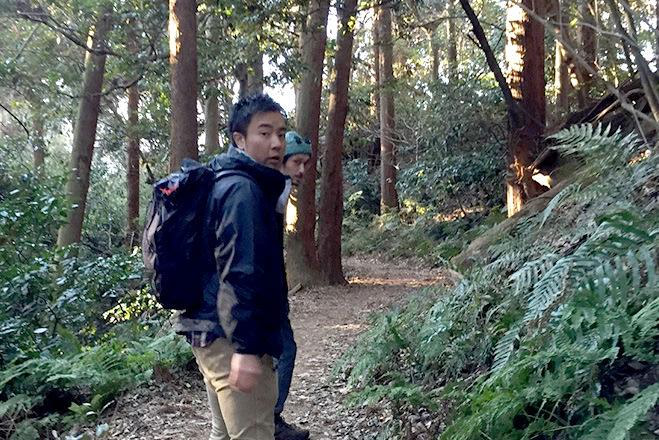I met Hiroyuki Oyabu, the director of the creative department at Monosus, about three years ago when I joined Monosus. He was a member of the same creative department (which was not yet a department at the time) to which I was assigned, and we worked together as one year senior.
When I first joined the company, my impression of him was that he was a friendly and lovable character. That impression remains true to many aspects of him, both at work and in his private life.
Even within the creative department, he has the largest number of projects among his fellow directors, and as he handles them daily, he has been nominated as director on several occasions by clients he previously worked with on new projects, clearly demonstrating the respect he enjoys from those around him.
I think he has the qualities to be loved and sought after by others. When I talk to him, I often feel that the wide range of topics he can discuss is due to his experiences and his inquisitiveness and honest attitude that connects to them.
Music, travel, studying abroad. Insatiable curiosity is the foundation of life
Where does Oyabu's talent come from?
He often talks about his past experiences in play and relationships, as well as his experiences studying abroad. Even just briefly, it is clear that he is satisfying his curiosity by pursuing his interests while interacting with people of a wide variety of races.
Born in Chiba City, Chiba Prefecture, Oyabu was an active student and early 20s, surfing with friends in his hometown, traveling, and attending many music events. In the process, he was looked after by several close seniors and built many friendships. It is easy to imagine how, at each event, he was friendly and open with everyone, from famous artists to local music lovers, even if you are just interacting with Oyabu today.
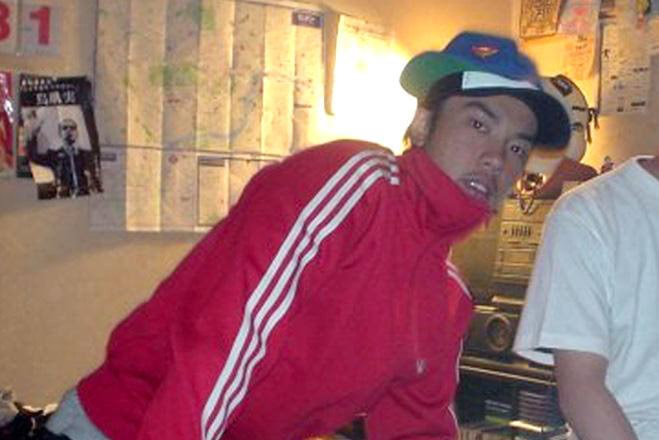
At the home of a senior colleague who had looked after me when I was in my early twenties.
Here we hear from Oyabu about his two years studying abroad in London from the age of 25 to 26, which became a turning point for him.
Two years in London
Tired of the constraints of my life up until then, I decided to try living abroad and started thinking about where to live when I was 24 years old. The first place I thought of was New York, which I had visited before. However, rather than a place where I could easily imagine myself living there, I wanted to choose a place I couldn't imagine myself living there, so I chose London, which I had never been to.
After deciding on the country he wanted to go to, Oyabu realized he had to start by saving up money, so he decided to save up 1 million yen, and worked multiple part-time jobs, including in transportation, from early morning until late at night.
Amazingly, he saved up the target amount in just 10 months and immediately began preparing to enroll in a language school in London. I am amazed at his incredible quick thinking and steadfastness in saving over 100,000 yen a month.
Thus, he started his one-year life in London. He realized that London is a city where you can't do anything interesting unless you have a lot of money. First, he thought about finding a job and looked through the job advertisements posted at his school. However, there were no jobs that he was interested in.
Thinking that there was no point in studying a language in a workplace filled with Japanese people, Oyabu wandered around the town alone and found a Japanese cafe on a street that had a rather dull atmosphere. His eyes caught the name of the cafe, "Mika," written in pink on a black sign, and the white letters "JAPANESE CAFE." Oyabu immediately went in, thinking that it looked interesting.
When she talked to Alan, the cafe manager, who was a Japanophile but had never been to Japan, about her search for work, the manager was delighted and immediately welcomed her in, as the cafe had never employed a Japanese person before. She began working as the first Japanese staff member at a Japanese cafe with no other Japanese staff, and gained the basics of life in London.
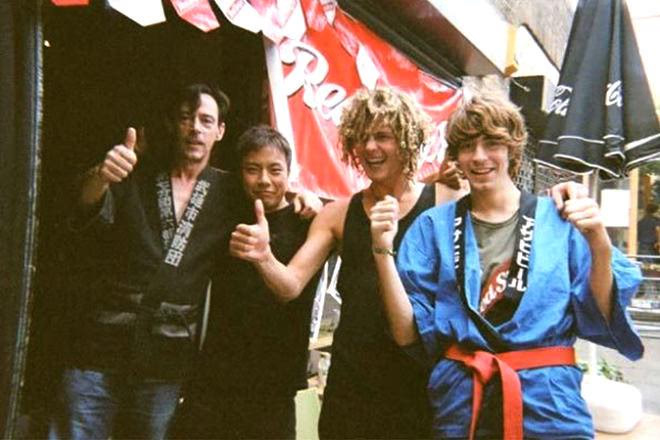
A photo of me working at JAPANESE CAFE Mika in London. The manager, Alan, is on the far left.
From then on, he became valued simply for being Japanese, and he was relied upon by the young British staff members in their early 20s, but he did his job well and steadily gained their trust.
As his earnings started to accumulate, he began planning a trip across Europe, since he was in England. When Oyabu tried to negotiate for a few days off, Alan was reluctant to take time off, saying, "Who's going to make the menu when you're gone?" It seems that Oyabu relied on him so much. However, his insatiable curiosity did not waver, and he enthusiastically conveyed his desire to enjoy his trip, saying, "I didn't come to London to work here," and finally succeeded in persuading Alan, "Have fun. I'll leave the restaurant to you." He made a trip across Europe, visiting Spain, France, Germany, and the Netherlands.
The photos that Oyabuchi showed me of him with his colleagues and regulars at "Mika" were all of them on friendly terms, which made it easy to imagine how much he was loved and adored.
While balancing work, play and studies, I extended my one-year study abroad plan by one year and lived in London for a total of two years. I got used to life there and made many like-minded friends. With only three months left, and starting to think about returning home, the owner handed out a notice to all staff that Mika was closing down.
Oyabu was highly valued as the first Japanese staff member, and perhaps because of the trust placed in him, he received about 600 pounds (1 pound was about 220 yen at the time) as a retirement bonus. Thinking that this was a chance, he decided to spend a month after his retirement traveling to India. In order to familiarize himself with the new country of India, he first went to the Indian area of London to look for cheap tickets and negotiated and consulted with Indians about the tickets. The Indians all said that he should not leave England, but should go after returning to Japan, but Oyabu explained in his newly acquired English about the closing of his workplace, his retirement bonus, and the fact that this was a great opportunity before his return home in two months, and successfully obtained the tickets and set off for his trip to India.
I vaguely planned to visit cities such as Mumbai, Varanasi, Rishikesh, Jaipur, and Delhi, and looked for cheap lodging in each city I visited and was looked after by locals, living as a backpacker for about a month. Along the way, I was invited by a young man I met in Delhi to stay at a floating lodge on a lake in the north, where relations with Pakistan were tense, and was stuck there for a day due to the instability of the situation. I went to Nepal with a couple I met in Rishikesh and went trekking for about a week, visited a temple in Bhutan that collapsed in last year's earthquake, and rented a motorbike in Jaipur to go touring on the sand. I enjoyed my wandering, with encounters determining the next course of my journey.
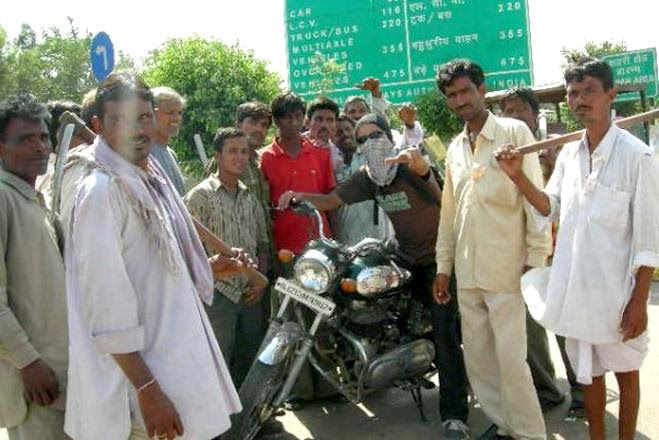
This is a commemorative photo from a stop in Jaipur, India, during a trip on the Pike. As soon as he pointed the camera at the camera, locals started crowding around him.
Oyabu then returned to London three days before his departure for Japan, stayed for two days at a friend's apartment where he had left his luggage, and then returned safely to Japan.
My encounter with HTML and joining Monosus
After returning to Japan, Oyabu promised his parents that he would find a job and started living alone in Tokyo. However, he was not able to find what he wanted to do right away and continued living like a NEET for a while. The turning point came when he came across an HTML reference book at a bookstore. Oyabu became interested and immediately bought several books, started creating a website according to the reference book, and became more and more absorbed in it. It seems that it was common for him to sit at his computer from morning to night with only coffee and cigarettes. He says that when he is absorbed in something, he doesn't need to eat as long as he has cigarettes and coffee.
Having mastered HTML, Oyabu became interested in full Flash websites, which were the mainstream at the time. He started by learning how to use Flash software, and then branched out into creating websites using action script. He started out creating websites as a hobby, but he ended up completing many works that could rival those of professionals, and he thought it would be a good idea to create a portfolio of these, so he began archiving them.
From that point on, Oyabu began to think that if it was something he enjoyed so much, he could continue it as a job, and looking for work that made full use of Flash technology, he applied for a part-time position at a company that ran a cloud-based learning service, armed with a portfolio of his archived work, and was successfully hired. He was tasked with creating reference animations to be viewed by users who registered for the learning service, and he turned what he had learned by himself to website creation into a full-fledged job. At the time, he was apparently confident that there was nothing he couldn't achieve with Flash, which shows just how much he had mastered the specialized technology.
While working there for a while, he was sometimes asked by acquaintances to create branding sites entirely in Flash, further advancing his career and improving the quality of his work. However, Flash sites were on the decline, and he was only able to work two days a week, so he gradually began to think about changing jobs. Seeking a position where he could utilize his past achievements, Oyabu interviewed at almost all of the well-known production companies in Tokyo, but there was little demand for Flash technology, which was on the decline, and he was tossed around by the waves of the times for programming languages such as JavaScript, which were in their infancy, and it seems that changing jobs was more difficult than he had expected.
In the end, even though he understood that JavaScript is not a very different technology in terms of fundamental thinking, he may have realized that his lack of experience and track record was the reason he would not be accepted. However, he did not give up and continued his job search. After interviewing at several companies, he met Monosus.
A relationship where you can share anything, from arguments to staying up all night
After successfully joining Monosus, Oyabu put his experience to good use and began working as a coder in the creative division. When I joined Monosus about three years ago, one of the first projects I was assigned to was to assist in the design of a website for a gifted elementary school, and Oyabu was the main coder at the time.
I felt a special affinity with him because we shared the same music, DJs, and events we went to, and we had mutual friends who attended those music events, and we talked about movies and the outdoors. The topics of conversation we had during breaks and other off-time were similar to those I had with my local friends and friends who hung out at music events, and even though I had just joined the company, he was one of the members I could easily trust.
On the other hand, we often had arguments while the project was underway, and even small things like pointing out mistakes I had made or disagreements about how to proceed with the project could ignite arguments, creating an atmosphere where neither of us could compromise.
More than two years have passed since Oyabu and I were separated into separate departments due to internal organizational changes, and we hardly ever worked together on projects. We had some communication during that time, but last year I was put in charge of the role of internal liaison for the design department's BtoB corporate website production projects, and I suddenly had more opportunities to work together again with Oyabu, who was in charge of directing BtoB projects in a different team. There, Oyabu, who was working to advance his career from coder to director, experienced several directions and realized that his skills were definitely improving.
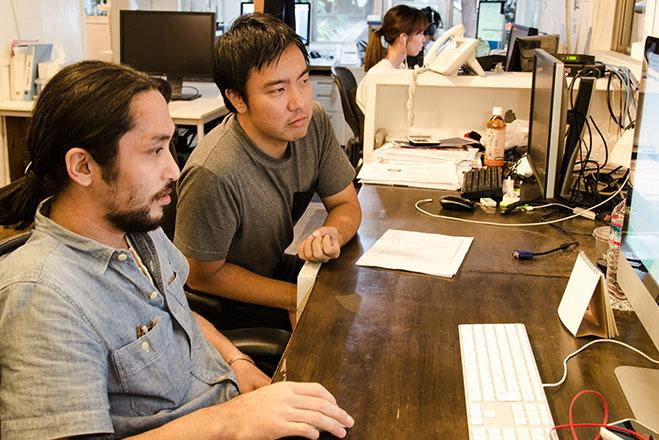
Oyabu and I discussing the page structure and design for a project.
Although Oyabu and I, who are in a director-designer relationship, often argued like when we first joined the company, we were able to proceed with projects much more smoothly than before. However, there were still some problems, and when we broke down the volume of production, which was not foreseen at the time of starting a project, into a schedule, we ran out of time because we had to design 10 or so pages for PCs and smartphones and parts in about a week, or when the design production was close to the deadline, we had to ask him to stay up past the last train and until the morning to help us.
From people to events, the journey continues.
Oyabu often talks about himself.
Although there are no specific details about when these events occurred or how many years ago they were, they convey the enjoyment they are having through stories of things that happened in countries they visited, funny stories they had with friends or seniors, their favorite music, and movies they have seen, all of which may seem like trivial things.
I observed him closely for about two weeks from when I was selected to introduce this article to when I started writing. Without being careful or asking any special questions. As always, Oyabu was talking to me in a friendly manner, bringing up fun topics without knowing that. There was no deep meaning behind those two weeks. For me, who doesn't usually observe people closely, it was just an important time to expand my image of him when introducing others.
I then told him that I was the person who had made the introduction and asked if I could interview him.
I invited him to lunch for the first time in a while, and we went to an Italian restaurant and a cafe, and interviewed him about his past. I had already heard the key points, so this time I asked him to talk about them in chronological order. Perhaps he is used to telling his story to people, or perhaps he had organized it for this day, but he smoothly told me the story of his life from his mid-20s to when he joined Monosus, accompanied by photos from his Facebook album. The conversation was lively until the end of the time, and I took notes and imagined some of Oyabu's life story, which I couldn't hear in such a short time.
Every time I hear such stories and see Oyabu speak with such enthusiasm about the people he was involved with and what he saw through their lives and culture, I get the feeling that he loves people more than anything else.
This is the starting point, as their interests broaden, they develop a desire to explore the things that catch their eye, and they take action in search of fun.
Oyabu does not try to fit into a mold, and is always curious about the people in front of him and what lies ahead. Perhaps we should liken him to a science-oriented brain, but once he finds something interesting, he has the attitude of steadily pursuing and trying to master it. Similarly, his communication with people seems to be built up one step at a time.
That's how he lives his life: walking alongside people.
I'm sure he will continue to meet many people, be inspired by them, and continue his journey with his intuitive curiosity as his compass.
